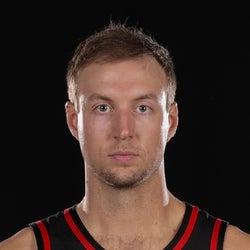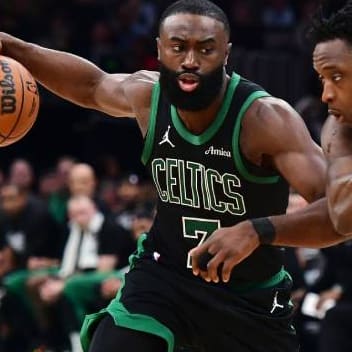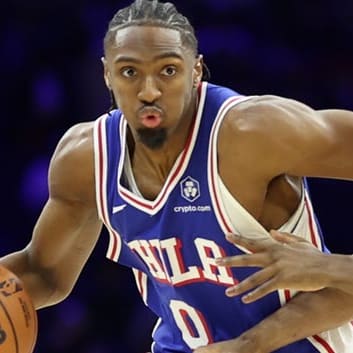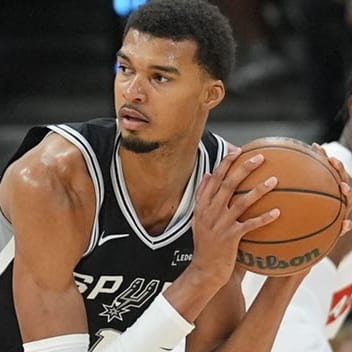2025 Stats
PTS
7.3
REB
2.0
AST
2.3
STL
0.8
BLK
0.0
ROS Projections
2025 Fantasy Outlook
Kennard signed a one-year, $11 million deal with the Hawks this offseason, joining Nickeil Alexander-Walker as a new addition to a backcourt led by Trae Young and Dyson Daniels. Caris LeVert, Bogdan Bogdanovic, De'Andre Hunter and Terance Mann played extensive backup minutes for the Hawks at times last year, but they are all out of the picture, opening up plenty of opportunities for Kennard and Alexander-Walker, who both shoot lights out from deep. Kennard shot 43.3 percent from beyond the arc last season, which was his lowest mark since 2019-20. Over the past five seasons, the sharpshooter has made 45.4 percent of his 4.9 three-pointers per game. Kennard's primary role will be to space the floor for Atlanta's dynamic duo of Young and Jalen Johnson, but the lefty could also see occasional playmaking duties as the backup point guard. Kennard can produce top-150 value when he gets hot from deep and is playing heavy minutes. However, his season-long value is always compromised because he has never been a full-time starter (his career-high 25 starts came in 2019-20 with Detroit) and has missed too much time due to injuries (65 regular-season appearances last season were the third most in his career). Read Past Outlooks
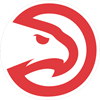
Available Monday
Kennard (back) has been cleared to play Monday against the Raptors, Brad Rowland of the Locked On Podcast Network reports.
ANALYSIS
Kennard sat out of Saturday's clash due to back soreness, but he'll be back in the mix Monday evening. He's averaging 8.6 points, 3.0 rebounds and 2.8 assists over his last five games.
Kennard sat out of Saturday's clash due to back soreness, but he'll be back in the mix Monday evening. He's averaging 8.6 points, 3.0 rebounds and 2.8 assists over his last five games.
NBA Per Game Stats
Per Game
Total
Per 36
NBA Per Game Stats
Loading Per Game Stats...
2025 NBA Game Log
2025
2024
2023
2022
2021
2020
2019
2018
2017
2025 NBA Per Game Split Stats
Schedule
By Month
Starting/Off Bench
Days Rest
Vs Opp
By Result
2025 NBA Per Game Split Stats
Loading Split Stats...
Advanced Stats
Loading Advanced Stats...
Stat Review
2025
2024
2023
2022
2021
2020
2019
2018
2017
How does Luke Kennard compare to other players?
This section compares his stats with all players from the previous three seasons (minimum 200 minutes played)*. The bar represents the player's percentile rank. For example, if the bar is halfway across, then the player falls into the 50th percentile for that stat and it would be considered average.
True Shooting %
66.6%
Effective Field Goal %
63.5%
3-Point Attempt Rate
61.7%
Free Throw Rate
18.0%
Offensive Rebound %
2.3%
Defensive Rebound %
8.6%
Total Rebound %
5.4%
Assist %
14.8%
Steal %
1.5%
Block %
0.1%
Turnover %
9.8%
Usage %
13.0%
Fantasy Points Per Game
14.7
Fantasy Points Per Minute
0.7
NBA Historical Fantasy Stats
Historical ADP
Loading Historical ADP...
Hawks Depth Chart
Our full team depth charts are reserved for RotoWire subscribers.
Subscribe Now
Hawks Rotation: Minutes Breakdown
Loading Hawks Rotation Data...
Average Fantasy Points
Minutes
FanDuel
DraftKings
Yahoo
FantasyDraft
Head2Head
Sorare
Average Fantasy Points are determined when Luke Kennard was active vs. non-active during the season. Click here to view average fantasy points for a different time period.
Loading Average Minutes...
Past Fantasy Outlooks
2024
2023
2022
2021
2020
2019
2018
2017
Kennard was limited to just 39 games during the 2023-24 regular season due to a knee injury. When healthy, he averaged 11.0 points, 2.9 rebounds, 3.5 assists and 2.5 three-pointers in 25.6 minutes per game. Known as an elite perimeter scorer, Kennard connected on 45 percent of his three-point attempts, which should ensure a consistent role again this season. Although Kennard's playing time was encouraging, the Grizzlies were without Ja Morant, Desmond Bane and Marcus Smart for significant portions of the season. Assuming they are healthy during the 2024-25 campaign, Kennard will likely play no more than 20 minutes per game. During the 2020-21 season, Kennard averaged 19.6 minutes per game with the Clippers, ending as the 286th-ranked player. Using that as a jumping-off point, managers should view Kennard as nothing more than an elite three-point streaming option. However, if Memphis is shorthanded again, Kennard could step into a larger role, providing sustainable backend value.
More Fantasy News

Iffy for Monday
Kennard (back) is listed as questionable for Monday's game against Toronto, Brad Rowland of the Locked On Podcast Network reports.
ANALYSIS
Subscribe now to instantly reveal our take on this news.
Subscribe now to instantly reveal our take on this news.

Won't play Saturday
Kennard has been ruled out for Saturday's game against Toronto due to back soreness, Brad Rowland of the Locked On Podcast Network reports.
ANALYSIS
Subscribe now to instantly reveal our take on this news.
Subscribe now to instantly reveal our take on this news.

Productive again in win
Kennard accumulated 15 points (6-12 FG, 2-5 3Pt, 1-1 FT), six rebounds, five assists and one steal across 27 minutes during Wednesday's 126-102 win over Minnesota.
ANALYSIS
Subscribe now to instantly reveal our take on this news.
Subscribe now to instantly reveal our take on this news.

Plays expanded role Monday
Kennard closed Monday's 140-129 loss to the Thunder with 12 points (4-8 FG, 3-6 3Pt, 1-1 FT), four rebounds, five assists and one steal over 31 minutes.
ANALYSIS
Subscribe now to instantly reveal our take on this news.
Subscribe now to instantly reveal our take on this news.

Scoreless in nine minutes
Kennard ended with one rebound, two assists and one steal across nine minutes during Sunday's 152-150 loss to the Bulls.
ANALYSIS
Subscribe now to instantly reveal our take on this news.
Subscribe now to instantly reveal our take on this news.
Latest Fantasy Rumors

Not happy with recent performances
Kennard is not happy with his play during the current season, according to Lauren L. Williams of The Atlanta Journal-Constitution. "I've had some good moments, good games, but nowhere near what I can be and what I expect of myself," Kennard said. "They've been on me, my teammates and coaches, just to be aggressive and shoot the ball when I can. ... I'm here for a reason, and for myself, I'm very hard on myself. I think I can do more, and I'm excited to just build off of it. And today was a great day for everybody, a great team win, and hopefully we can just build off of that."
ANALYSIS
Kennard is one of the best shooters in the NBA, but the veteran hasn't been happy with his play throughout the 2025-26 campaign. He's averaging just 6.8 points per game since December, although at least he's shooting 47.4 percent from deep in that span. He might be on the right path toward turning things around, though, as he's scored in double digits in each of his last three appearances.
Kennard is one of the best shooters in the NBA, but the veteran hasn't been happy with his play throughout the 2025-26 campaign. He's averaging just 6.8 points per game since December, although at least he's shooting 47.4 percent from deep in that span. He might be on the right path toward turning things around, though, as he's scored in double digits in each of his last three appearances.


